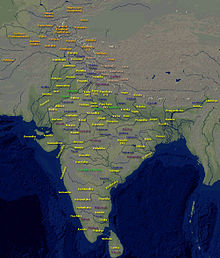| Revision as of 19:26, 29 May 2008 edit151.188.17.247 (talk)No edit summary← Previous edit | Revision as of 19:26, 29 May 2008 edit undoClueBot (talk | contribs)1,596,818 editsm Reverting possible vandalism by 151.188.17.247 to version by GourangaUK. False positive? Report it. Thanks, User:ClueBot. (400326) (Bot)Next edit → | ||
| Line 2: | Line 2: | ||
| {{mergeto|Nishada Kingdom|date=March 2008}} | {{mergeto|Nishada Kingdom|date=March 2008}} | ||
| '''Nishadha''' (]: निषाध ''{{IAST|niṣādha}}''), '''Nishaad''', or '''Nishad''' was an indigenous tribe inhabiting ], according to sources in ]. The Nishadha people have been described in ] and ] |
'''Nishadha''' (]: निषाध ''{{IAST|niṣādha}}''), '''Nishaad''', or '''Nishad''' was an indigenous tribe inhabiting ], according to sources in ]. The Nishadha people have been described in ] and ]. | ||
| ==Description in Ramayana== | ==Description in Ramayana== | ||
Revision as of 19:26, 29 May 2008

| It has been suggested that this article be merged into Nishada Kingdom. (Discuss) Proposed since March 2008. |
Nishadha (Sanskrit: निषाध niṣādha), Nishaad, or Nishad was an indigenous tribe inhabiting ancient India, according to sources in Hindu mythology. The Nishadha people have been described in Ramayana and Mahabharata.
Description in Ramayana
The main profession of Nishaads was hunting the birds. When a Nishaad had killed one bird from a pair, the other bird was crying, and that inspired Valmiki to write the true story of Rama and Sita known as Ramayana. In Ramayana, the king of Nishaad, named Guha, was a very close friend of Rama. He helps Rama and Sita to cross Ganges river.
Description in Mahabharata
The Mahabharata speaks of Nishaad (or Shabara) as forest hunters.
Music
In Indian music, Nishad is the seventh note (swara) of the octave.
See also
References
- Ramayana by Valmiki, Gita Press publication, Gorakhpur, India
- The Cultural Process in India by Irawati Karve, Vol. 51, Oct., 1951 (Oct., 1951), pp. 135-138
| Hindu deities and texts | ||
|---|---|---|
| Gods |  | |
| Goddesses | ||
| Other deities | ||
| Texts (list) | ||
This Hindu mythology–related article is a stub. You can help Misplaced Pages by expanding it. |